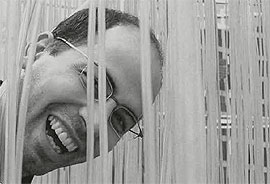INTERNATIONAL RETROSPECTIVE - ANDRÉS DI TELLA

Andrés Di Tella and the Documentary of the "I"
IN THE SCOPE OF RICH AND ALWA 125 YS renewed Argentinean
documentary filmmaking, the work of Andrés Di
Tella stands out for reflecting about the documentary
genre while at the same time making us see reality
according to his gaze.
Di Tella began as a video artist and also worked for television
studios before dedicating himself to making feature
films with very diverse cultural and social themes.
However, all of his productions have in common their
desire to explore the encounter between the fictional
and the documentary.
The narrative structure of his first feature film, Montoneros,
a Story, is based on a trip that takes advantage
of spatial displacement to instate a long dialogue
with Ana Testa, who remembers her militancy and the
posterior repression of which she was a victim. In this
transfer in the direction of the past, Di Tella aims to
escape the traditional political documentary thought
of as a testimony or a document in order to show the
viewer the vital experience of militants, charged with
ideas but also emotions, humor and much fragility.
Already in this first film, the filmmaker introduces several
of the elements that he works with throughout
his filmography. On one side is the option of showing
intellectual and technical operations that allow him to
develop the films he makes; on the other is working
subjective enunciation within the documentary.
In this sense, The Television and I implies a landmark
in his filmography. It is there that he opens the toolbox
he works with for the audience's gaze, that is, the
audiovisual material he uses and the contradictory way
in which this material is built and ordered.
Di Tella presents himself in the first person to express
the tensions between his conscious purposes and the
way in which they reframe themselves during the creative
process. For this, he puts at our disposal the
difficulties and passions that awaken in the path of
knowledge.
Like The Television and I is a film in which Di Tella
explores his relationship with the industrial project of
his paternal family, Fotografias centers on memory as a
maternal legacy. In the first, the emphasis is on showing
how the public and the private are articulated in the
scope of a family in Argentina is a synonym of industrial
development and aesthetic vanguard. In the second
film, the filmmaker moves in Hindu culture to encounter
a spirituality that comes out as very distant, though it
brings him closer to his mother.
The diptych does not put into play this autobiographical
raw material to move the viewer, but to absolutely
break the tradition of the classic and expository documentary,
looking within, interconnecting the facts that
want to know with complex and chaotic networks in
which personal, social, historical and cultural reasons
intervene.
His last creation, Blows of the Ax assumes the richness
of the documentary is rooted in the possibility that the
viewer sees the process of knowledge in which the
filmmaker moves in order to appropriate a determined
reality. This time Di Tella is obliged to plunge into the
abyss, as the object of observation is the artist Claudio
Caldini and his work. Thus, in these images the certainties
and uncertainties of two creative universes that
always experiment on the limit of artistic conceptions
intertwine.
In summary, Andrés Di Tella produced a body of work that is full of surprises, including a systematic theoretical
reflection on the genre. Innovation and self-consciousness
are the words that best characterize his works.
Clara Kriger
Movies


|
The Devil's Country
ANDRÉS DI TELLA (ARGENTINA/ ARGENTINA, 2008)
|


|
Photographs
ANDRÉS DI TELLA (ARGENTINA/ ARGENTINA, 2007)
|


|
Blows of the Ax
ANDRÉS DI TELLA (ARGENTINA/ ARGENTINA, 2011)
|


|
The Television and I
ANDRÉS DI TELLA (ARGENTINA/ ARGENTINA, 2002)
|


|
Macedonio Fernández
ANDRÉS DI TELLA (ARGENTINA/ ARGENTINA, 1995)
|


|
Montoneros, a Story
ANDRÉS DI TELLA (ARGENTINA/ ARGENTINA, 1995)
|


|
Prohibited
ANDRÉS DI TELLA (ARGENTINA/ ARGENTINA, 1997)
|


|
Reenactment of the Model’s Crime
ANDRÉS DI TELLA, FABIÁN HOFMAN (ARGENTINA/ ARGENTINA, 1990)
|
|





